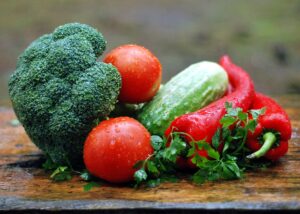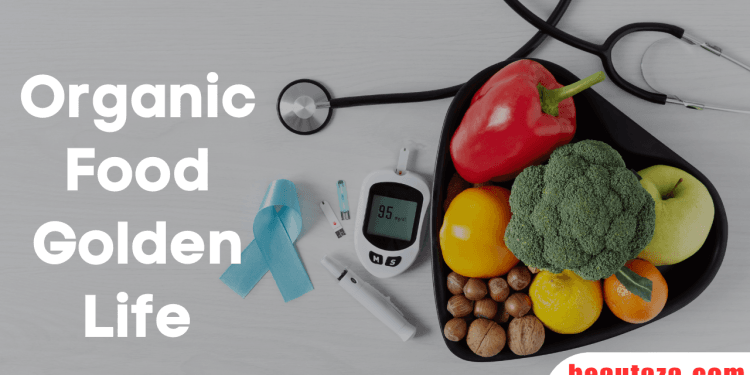
I will discuss Organic Food Golden Life in this blog post. Many of us seek ways to lead healthier, more fulfilling lives in a world that seems ever faster. One significant aspect of this journey involves the food we consume. As awareness of the impact of our dietary choices on both personal well-being and the environment grows, so does the interest in organic food.
Organic food has emerged as a powerful catalyst for positive change, offering a golden path to a healthier and more sustainable future. With its roots deeply entwined in natural farming practices, organic food brings us back to a more straightforward, more authentic way of nourishing our bodies and the planet.
Understanding Organic Food
Organic food is more than just a trend; it is a philosophy and a way of life. At its core, organic food embodies a commitment to sustainability, health, and environmental consciousness. Understanding what makes organic food unique and different from conventionally grown produce is essential in appreciating its numerous benefits.
Definition of Organic Food: Organic food refers to agricultural products cultivated without synthetic chemicals, such as pesticides, herbicides, and fertilizers. It involves following strict guidelines and principles prioritizing natural, eco-friendly farming methods. Organic farmers strive to work harmoniously with nature, recognizing that a healthy ecosystem yields healthier crops.
Organic Farming Practices:
The foundation of organic farming lies in nurturing the soil’s health and fertility. Organic farmers avoid using genetically modified organisms (GMOs) and employ natural methods to control pests and diseases, such as crop rotation, companion planting, and introducing beneficial insects. They also refrain from using artificial hormones and antibiotics in livestock production.
Importance of Certifications and Labels:
To ensure the authenticity of organic products, reputable certification bodies like the United States Department of Agriculture (USDA) and the European Union’s organic regulations set strict standards. Look for labels like “USDA Organic” or “EU Organic” to verify that the product meets these criteria.
Environmental Benefits:
One of the most significant advantages of organic farming is its positive impact on the environment. Organic practices protect soil quality, promote biodiversity, and reduce water pollution by eschewing harmful chemicals. Organic farms also tend to emit fewer greenhouse gases, making them vital in the fight against climate change.
Health Benefits:
Organic food is widely celebrated for its potential health benefits. Studies suggest that organic produce may contain higher levels of certain nutrients, such as antioxidants and essential minerals. Moreover, the absence of pesticide residues in organic food can reduce exposure to harmful chemicals, potentially lowering the risk of specific health issues.
The Health Benefits of Organic Food
Organic food offers a wealth of health benefits that go beyond simply being free from synthetic chemicals. Embracing organic produce can lead to a more nourishing and balanced diet, contributing to overall well-being. Here are some of the critical health advantages of consuming organic food:
- Reduced Exposure to Pesticides: One of the primary reasons people opt for organic food is to minimize exposure to harmful pesticides and herbicides. Studies have shown that organic produce generally has lower pesticide residues than conventionally grown counterparts. By choosing organic, we can significantly reduce our intake of these potentially toxic chemicals, which may be linked to various health issues.
- Higher Nutritional Value: Organic fruits, vegetables, and grains have been found to contain higher levels of certain nutrients, such as vitamins, minerals, and antioxidants. For instance, some studies have shown that organic fruits may have more vitamin C, while organic vegetables may have more iron and magnesium. These nutritional advantages can contribute to better health and increased vitality.
- No GMOs: Organic food is produced without genetically modified organisms (GMOs). While the long-term effects of GMO consumption are still being studied, some individuals prefer to avoid them due to concerns about potential health risks. Organic products provide a GMO-free alternative for those seeking a more natural and traditional approach to food.
- No Synthetic Additives: Organic processed foods, such as organic snacks and packaged goods, are typically free from synthetic additives, preservatives, and artificial flavors and colors. Avoiding these additives may benefit individuals with sensitivities or allergies to certain chemicals.
Organic Food and the Golden Life
Embracing organic food is not just a dietary choice; it represents a lifestyle that aligns with balance, health, and sustainability principles. As we delve into the connection between organic food and the golden life, we uncover how this conscious decision can lead to a more fulfilling and enriching existence.
Nourishing the Body:
Organic food serves as a powerful source of nourishment for our bodies. With higher nutrient levels, free from harmful chemicals, and often more flavorful, organic fruits, vegetables, and grains provide essential vitamins, minerals, and antioxidants that contribute to overall well-being. By fueling our bodies with wholesome organic food, we can experience increased energy, mental clarity, and improved physical health.
Promoting Mindful Consumption:
Adopting an organic lifestyle encourages us to be more mindful of our consumption. By understanding the journey of our food from farm to table, we develop a deeper appreciation for the resources involved and the efforts of organic farmers. This awareness can extend to other aspects of our lives, fostering tremendous gratitude and conscious decision-making.
Supporting Sustainable Agriculture:
Organic food supports sustainable agriculture practices, essential for preserving the Earth’s resources for future generations. Organic farming methods focus on maintaining soil health, promoting biodiversity, and reducing the environmental impact of agriculture. By supporting these practices, we actively safeguard the planet for a more sustainable and golden future.
Conclusion
In a world of choices, embracing organic food opens the door to a golden life brimming with vitality, balance, and sustainability. Deepen knowledge of organic food; thrive and protect the environment; make better choices for well-being.
By nourishing our bodies with organic produce, we enjoy higher nutrient content and reduced exposure to harmful chemicals and cultivate a mindful connection to our food. Organic food becomes a conduit for gratitude, appreciation, and responsibility towards our planet and its resources.
Beyond personal health, organic food offers a path to support local communities and sustainable agriculture. Choosing organic means contributing to the preservation of biodiversity, the health of our soil, and the mitigation of climate change. In these actions, we become stewards of a golden life, recognizing that our choices today shape the world of tomorrow.
As we savor the flavors and benefits of organic food, we also nourish our emotional well-being, fostering harmony and balance within ourselves. The path to a golden life is about more than just physical health; it is about nurturing our souls and embracing the interconnectedness of all living beings.
Leading by example, we inspire others to join us on this transformative journey toward a healthier, more sustainable future.
Read –














